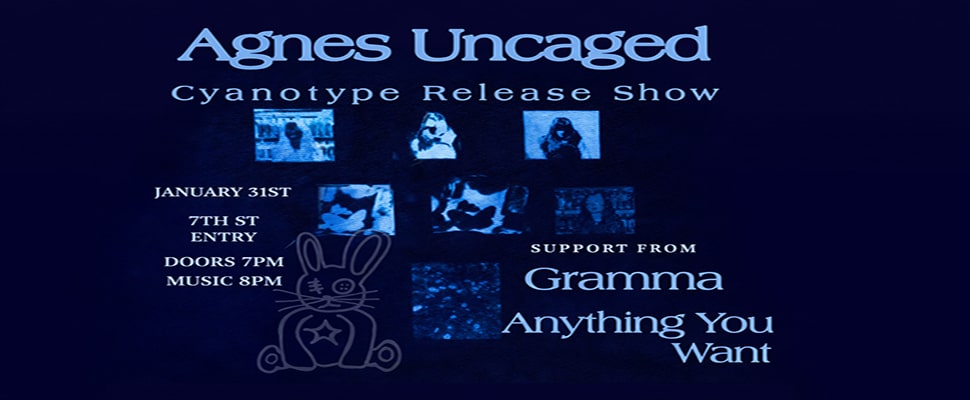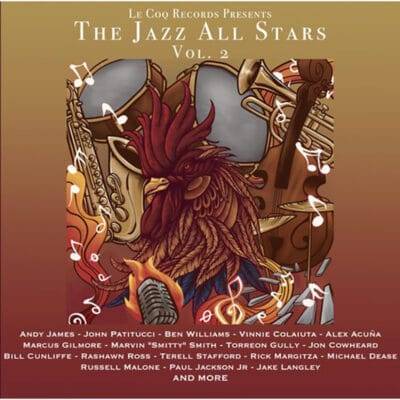The Jazz All Stars Volume 2
Volume 2
Le Coq
The straight-ahead jazz label Le Coq enters its second year, reprising their introductory salvo of 2021, Volume 1, featuring an aggregation of premiere jazz musicians, with The Jazz All Stars, Volume 2. Most of the inaugural roster is aboard including both pianist/composer/arrangers Bill Cunliffe and John Beasley and bassists John Patitucci and Chris Colangelo. Drummers Vinnie Colaiuta and Marvin “Smitty” Smith join with percussionist Alex Acuna, guitarist Jake Langley and vocalist Andy James. Trumpeter Terell Stafford and saxophonist Rick Margitza appear as well. Augmenting this impressive lineup are the equally revered saxophonists Chris Potter and Bob Sheppard, bassist Ben Williams, drummers Marcus Gilmore and Terreon Gully, trombonist Michael Dease, keyboardist Jon Cowherd, guitarists Russell Malone and Paul Jackson Jr., and trumpeter Rashawn Ross. One would be hard pressed to find a more prestigious lineup of contemporary jazz musicians on any album. Yet, while it may read like a big band roster, only three of the nine feature a large group while the other tracks have quintet and sextet configurations.
The program is a mix of compositions from Cunliffe and Beasley and jazz classics as well as standards. It’s intentionally a wide swath of styles, designed to bring out the best in these outstanding players. The opening large ensemble piece, Cunliffe’s “Whatever You Say” features propulsive drumming from Gilmore, a heated sax-trumpet exchange between Potter and Stafford and a facile Cunliffe piano solo, and fluid lines from Langley. The Latin-tinged melodic “Witches” retreats to a sextet with Margitza soloing to the percussive beats of Acuna and Colaiuta before Langley and later Cunliffe step in with their own keening statements as bassist Colangelo holds down the bottom. This same cast renders “Balinda” with Margitza improvising inventively around the melody in his extended solo. Langley delivers a spirted solo as Cunliffe comps and Coliauta stirs up a frenzy on the kit with especially dazzling cymbal work.
The group then turns to the Jerome Kern/Otto Harbach standard arranged by Cunliffe “Yesterdays” with the same rhythm section as “Witches” as vocalist James takes her sultry turn answered by an equally soulful tenor solo from Potter. James returns for Horace Silver’s “Doodlin’,” backed just by the rhythm section of Smith, Colangelo, and Cunliffe who also penned the playful arrangement. Though not reflected in the credits, it appears that we hear contributions from Dease, Margitza, and Stafford as well.
Cunliffe’s “The Before Times” returns to the large ensemble format as he marks those times from not so long ago, pre-pandemic, that to most of us seem like ages ago. This one begins pensively with low register ensemble parts that make way first for beautifully articulated lines from Stafford followed by a rumbling agitated trombone from Dease that leads into statements from Potter and Sheppard before Stafford reprises the theme.
Beasley takes his one turn with “Freddie’s Blues” featuring a completely new set of players – Gully, Williams, Malone, Jackson Jr., and Ross. This funky piece hits deep with Malone and Jackson Jr. trading guitar licks, a gutty spot from Williams and heated trumpet from Ross who mostly gigs as a full-fledged member of the Dave Matthews Band.
Cunliffe brings an octet for his easy strolling “Around the Corner” as Patitucci and Gilmore lock in the rhythm over which Potter, Sheppard, and Dease blow unison lines and perky, brief solos. As with the other Cunliffe large ensemble pieces, there is robust chording with Cowherd’s Rhodes and Langley’s guitar joining his piano. The album closes with the breezy “Danse,” the third piece from the sextet of Coliauta, Acuna, Margitza, Colangelo, Langley, and Cunliffe with lyrical solos from the latter three.
Label owners Piero Pata and Andy James seem intent on recreating the kind of sound from those halcyon years of the ‘60s when hosts of premiere artists would appear on recordings, regardless of what main label they were signed to. His goal was to assemble the greatest modern musicians that he could. He says it this way, “We wanted to get back to the old adage of having a pool of artists that could achieve anything the label required for its next goal. There are obviously many wonderful players we at Le Coq would love to record with. That will come. I hope!”
We’re not sure who he has in mind as this is as wonderful a group of players as any. Yet although solid in every way, its balance lies with compositions. As such it offers just a few blistering, jaw-dropping improvisational spots and not nearly as much fire as some of the artists are capable of. 00000/ Nonetheless, due to the variety and the augmented cast, it’s a clear step up from Volume 1.
- Jim Hynes
Buy Us a Cup of Coffee!
Join the movement in supporting Making a Scene, the premier independent resource for both emerging musicians and the dedicated fans who champion them.
We showcase this vibrant community that celebrates the raw talent and creative spirit driving the music industry forward. From insightful articles and in-depth interviews to exclusive content and insider tips, Making a Scene empowers artists to thrive and fans to discover their next favorite sound.
Together, let’s amplify the voices of independent musicians and forge unforgettable connections through the power of music
Make a one-time donation
Make a monthly donation
Make a yearly donation
Buy us a cup of Coffee!
Or enter a custom amount
Your contribution is appreciated.
Your contribution is appreciated.
Your contribution is appreciated.
DonateDonate monthlyDonate yearlyYou can donate directly through Paypal!
Subscribe to Our Newsletter
Order the New Book From Making a Scene
Breaking Chains – Navigating the Decentralized Music Industry
Breaking Chains is a groundbreaking guide for independent musicians ready to take control of their careers in the rapidly evolving world of decentralized music. From blockchain-powered royalties to NFTs, DAOs, and smart contracts, this book breaks down complex Web3 concepts into practical strategies that help artists earn more, connect directly with fans, and retain creative freedom. With real-world examples, platform recommendations, and step-by-step guidance, it empowers musicians to bypass traditional gatekeepers and build sustainable careers on their own terms.
More than just a tech manual, Breaking Chains explores the bigger picture—how decentralization can rebuild the music industry’s middle class, strengthen local economies, and transform fans into stakeholders in an artist’s journey. Whether you’re an emerging musician, a veteran indie artist, or a curious fan of the next music revolution, this book is your roadmap to the future of fair, transparent, and community-driven music.
Get your Limited Edition Signed and Numbered (Only 50 copies Available) Free Shipping Included
Discover more from Making A Scene!
Subscribe to get the latest posts sent to your email.









